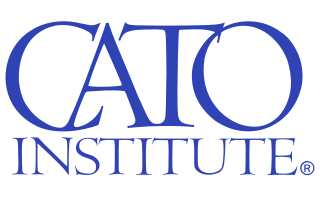
The Cato Institute is an American libertarian think tank headquartered in Washington, D.C. It was founded in 1977 by Ed Crane, Murray Rothbard, and Charles Koch, chairman of the board and chief executive officer of Koch Industries. Cato was established to focus on public advocacy, media exposure, and societal influence.

"Starve the beast" is a political strategy employed by American conservatives to limit government spending by cutting taxes, to deprive the federal government of revenue in a deliberate effort to force it to reduce spending. The term "the beast", in this context, refers to the United States federal government and the programs it funds, primarily with American tax money, particularly social programs such as education, welfare, Social Security, Medicare, and Medicaid.
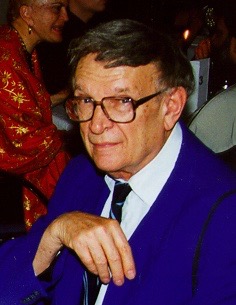
John Hospers was an American philosopher and political activist. Hospers was interested in Objectivism, and was once a friend of the philosopher Ayn Rand, though she later broke with him. In 1972, Hospers became the first presidential candidate of the Libertarian Party, and was the only minor party candidate to receive an electoral vote in that year's U.S. presidential election.
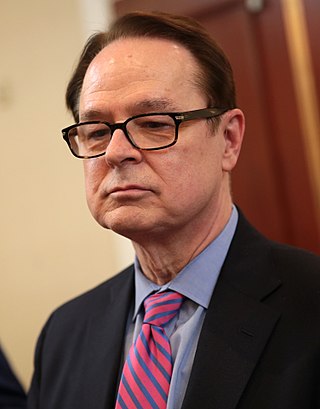
David Douglas Boaz was an American author, philosopher and editor. He was a distinguished senior fellow and the executive vice president of the Cato Institute, an American libertarian think tank.
Edward Harrison Crane is an American libertarian and co-founder of the Cato Institute. He served as its president until October 1, 2012.
The Calgary School is a term coined by Ralph Hedlin in an article in the now defunct Alberta Report in reference to four political science professors – Tom Flanagan, Rainer Knopff, Ted Morton, and Barry F. Cooper – who became colleagues at Alberta's University of Calgary in the early 1980s. They shared and promoted similar ideas about how political scientists could shape the rise of a particular kind of conservatism in Canada – informed by theories based on Friedrich Hayek and Leo Strauss. Cooper and Flanagan had met in the 1960s at Duke University while pursuing doctoral studies, while Knopff and Morton were both mentored by Walter Berns, a prominent Straussian, at the University of Toronto. They were economic, foreign policy, and social conservatives who were anti-abortion and were not in favour of legalizing gay marriage. They supported Stephen Harper in his 1993 election campaign, and former Alberta premiers Ralph Klein and Jason Kenney. A fifth University of Calgary professor, David Bercuson, co-authored publications with Cooper but was more loosely associated with the group and, at times, disagreed with the others on these public policies and candidates.

Matthew Yglesias is an American blogger and journalist who writes about economics and politics. Yglesias has written columns and articles for publications such as The American Prospect, The Atlantic, and Slate. In 2014 he co-founded the news website Vox.
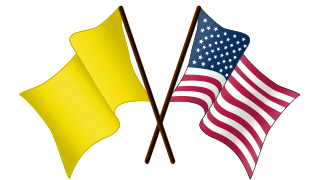
Propertarianism, or proprietarianism, is a political philosophy that reduces all questions of law to the right to own property. On property rights, it advocates private property based on Lockean sticky property norms, where an owner keeps their property more or less until they consent to gift or sell it, rejecting the Lockean proviso. Propertarianism is often described by its advocates as either synonymous with capitalism or its logical conclusion.
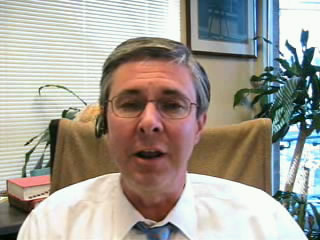
Brink Lindsey is an American political writer, and Vice President and Director of the Open Society Project at the Niskanen Center. Previously he was the Cato Institute's vice president for research. From 1998 to 2004, he was director of Cato's Center for Trade Policy Studies, focusing on free trade, and also editor of Cato Unbound, a monthly web magazine. He was a senior fellow with the Kauffman Foundation from 2010 to 2012. An attorney with a background in international trade regulation, Lindsey was formerly director of regulatory studies at Cato and senior editor of Regulation magazine.

William Arthur Niskanen was an American economist. He was one of the architects of President Ronald Reagan's economic program and contributed to public choice theory. He was also a long-time chairman of the Cato Institute, a libertarian think-tank.

Ezra Klein is an American journalist, political analyst, New York Times columnist, and the host of The Ezra Klein Show podcast. He is a co-founder of Vox and formerly was the website's editor-at-large. He has held editorial positions at The Washington Post and The American Prospect, and was a regular contributor to Bloomberg News and MSNBC. His first book, Why We're Polarized, was published by Simon & Schuster in January 2020.
Jerome Cogburn Taylor is an American environmental activist, policy analyst, and game designer. Taylor cofounded the Niskanen Center, a Washington, D.C.–based think tank that, among other things, advocates for market environmentalism and the adoption of a carbon tax system to combat global warming.

Econ Journal Watch is a semiannual peer-reviewed electronic journal established in 2004. It is published by the Fraser Institute. According its website, the journal publishes comments on articles appearing in other economics journals, essays, reflections, investigations, and classic critiques. As of 2017, the Journal maintained a podcast, voiced by Lawrence H. White.

In American politics, fusionism is the philosophical and political combination or "fusion" of traditionalist and social conservatism with political and economic right-libertarianism. Fusionism combines "free markets, social conservatism, and a hawkish foreign policy". The philosophy is most closely associated with Frank Meyer.
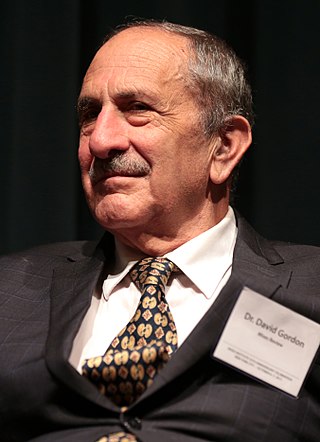
David Gordon is an American libertarian philosopher and intellectual historian influenced by Murray Rothbard's views of economics. He is a senior fellow of the Ludwig von Mises Institute, a libertarian think tank, and is the editor of The Mises Review.
Ronald Hamowy was a Canadian academic, known primarily for his contributions to political and social academic fields. At the time of his death, he was professor emeritus of intellectual history at the University of Alberta in Edmonton, Canada. Hamowy was closely associated with the political ideology of libertarianism and his writings and scholarship place particular emphasis on individual liberty and the limits of state action in a free society. He is associated with a number of prominent American libertarian organizations.

Vox is an American news and opinion website owned by Vox Media. The website was founded in April 2014 by Ezra Klein, Matt Yglesias, and Melissa Bell, and is noted for its concept of explanatory journalism. Vox's media presence also includes a YouTube channel, several podcasts, and a show presented on Netflix. Vox has been described as left-leaning and progressive.
The Niskanen Center is an American think tank based in Washington, D.C. that advocates environmentalism, immigration reform, civil liberties, and strengthening social insurance around market-oriented principles. Named after William A. Niskanen, an economic adviser to Ronald Reagan, it states that its "main audience is Washington insiders", and characterizes itself as moderate. The organization has been credited with fostering bipartisan dialogue and promoting pragmatic solutions to contemporary political challenges on issues such as family benefits, climate change, and criminal justice reform.
Persuasion is a nonprofit digital magazine and community focused on providing a forum for discussions of society, politics, and culture from a philosophically liberal perspective. Founded in July 2020 by political scientist and Atlantic contributing writer Yascha Mounk, the organization publishes an eponymous digital magazine, Persuasion; produces a weekly podcast, The Good Fight with Yascha Mounk; and hosts online events with speakers from across the political spectrum.












